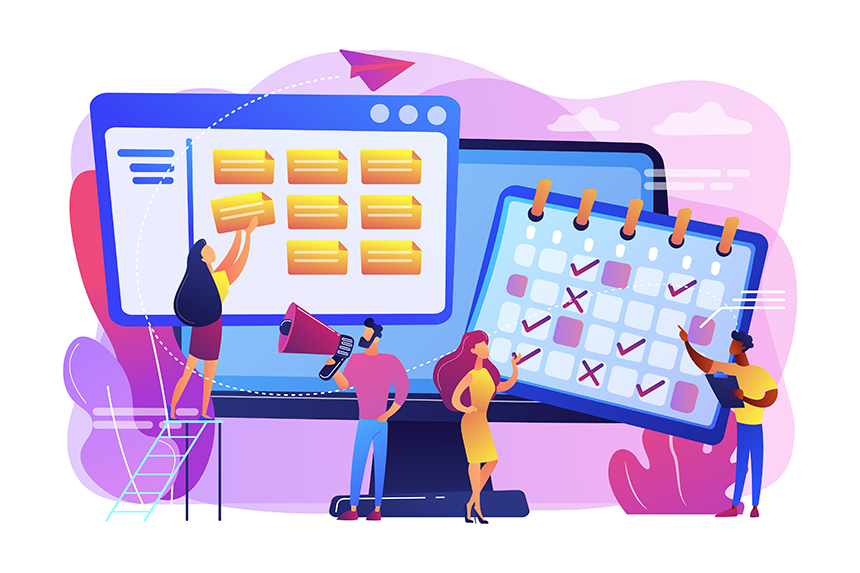With the critical role that content plays in today’s world, having a digital content team with the skillset to handle the demands of the customer journey and manage numerous digital channels is essential. They need to be able to execute content marketing strategies, manage personalization efforts and create interconnected experiences for your customers.
Forrester says that 52% of B2B marketing leaders plan to increase their spending on content marketing and personalization technology to keep up with demand. When a company invests in technology, they also need to ensure that they have the right team members to maximize that investment; otherwise, it becomes a huge sunk cost.
Content coordinators are some of the key members of any business’s marketing team. Working closely with writers, content strategists, marketers, content managers, and more, they ensure that content gets created to match brand voice and vision.
But what does the content coordinator role and entail, and what sort of skill set is required? In this article, we’ll dive into those questions and provide the answers you need, whether you’re considering the role yourself or hiring for it at your company.
What Is A Content Coordinator?
Is your company getting ready for a major marketing campaign launch? Maybe you’re planning an event to increase brand awareness and need everything to go off without a hitch. These are the types of situations where your company is likely to use your content coordinator the most.
They are “the person in a marketing team whose duty is to oversee all aspects of content strategy, ideation, creation, and promotion,” says Mile Zivkovic, Head of Content at Better Proposals.
A content coordinator is responsible for creating a content strategy, assigning tasks to relevant team members, and ensuring that the content gets completed and is up to the necessary standard.
The content coordinator supports any content production efforts a business might need. Stacey Deakins, VP of Marketing at Options Open, provides an example. “So, this could be a support role for a YouTuber or Influencer, or for a business that often contributes to communities with meaningful material. The content can take on many forms, including video, audio, images, or written.”
The role of the content coordinator will vary depending on the company. Still, generally, they will be responsible for managing a content calendar and keeping it organized, being the lead person for communicating with various channel stakeholders, sending content to the publishing team, and identifying potential partnerships, whether with a complementary brand or influencer.
Skills That Bring Success For a Content Coordinator
Being a content coordinator can be a fun but also a challenging job. So we’ve identified some of the key skills that bring success.
Business Awareness
It may seem like something only reserved for executives and partners, but business awareness is an essential skill for a successful content coordinator as well. “The content coordinator needs to have a complete understanding of both the lead stakeholders’ goals and organizational objectives – in order for the design, marketing, and sales departments to effectively develop and communicate content,” says Craig Singleton, Senior Copywriter at Learning Tree International.
Content Creation
It goes without saying that a content coordinator would need to create content. However, the type of content they will need to create could vary depending on the company. For Zivkovic, the core expertise should always include written content. “This person needs to be highly skilled at creating content, following SEO best practices, improving readability and user experience.”
Storytelling
Creating content also requires content coordinators to be good at storytelling. Whether they’re presenting the latest marketing campaign data to key stakeholders or creating a piece of content to educate their ideal buyer’s persona, a content coordinator must be able to tell a story if they want to be engaging and not easily forgotten.
Organization
A content coordinator should be very organized as they will work with a variety of people and tools. “This position may need to work with several departments in a big company, including development, customer service, marketing, and IT,” adds Deakins. Plus, they need to manage content campaigns and keep track of how other team members and departments are handling everything. If a content coordinator is disorganized, it could lead to several failed campaigns.
Research and Analysis
Whether trying to find the best SEO keywords or studying the latest channel data to determine if a campaign was successful, a content coordinator needs to be good at researching and then analyzing data to come up with suitable insights.
Graphic Design
As a content coordinator, you don’t need to be an expert in graphic design. However, knowing how to create visual content that’s critical for social media platforms or simply to use as part of your company’s latest blog article is important. Tools like Canva are readily available to make design work much easier, but a content coordinator should still know some design elements.
Video Editing
Many consumers enjoy the convenience of video for viewing content, and content coordinators need to be able to cater to that demand. Explainer videos, visual podcasts on YouTube, and more are ideal for video content. As a result, content coordinators who can edit video content and create entertaining and educational tips can provide tons of value for their companies.
Other Factors to Consider In The Modern Era
A content coordinator needs to have certain skills to achieve success, but they must also be aware of two key things in the modern business era.
Omnichannel Content Delivery
Most businesses don’t only have content for a website or blog. Even social media platforms are table stakes in the modern era. Content now gets delivered to various channels, from mobile devices to digital kiosks and VR devices. Businesses tend to rely on a headless CMS to enable this omnichannel content delivery. Content coordinators need to know how to use a headless CMS and coordinate content campaigns across these channels.
DevContentOps
Along with omnichannel delivery, the modern digital landscape requires content teams to work more closely with developers than they ever have before. When it comes to building software applications, developers already benefit from DevOps. The DevOps culture enables faster delivery of software applications and new features, higher security, and better customer satisfaction, among other benefits. But when it comes to content management, things don’t always go according to plan.
With DevContentOps, content, the CMS, and the content team members (such as the content coordinator) get brought into the DevOps workflows. The result is neither content publishing nor software production getting slowed down by each other, and easier collaboration occurs between the development team and the content team.
The content coordinator role is crucial in today’s digital world. However, success should be around the corner if the person hired for the position has some of the skills we mentioned above and is aware of how things are changing.

 Sarah Miller
Sarah Miller




